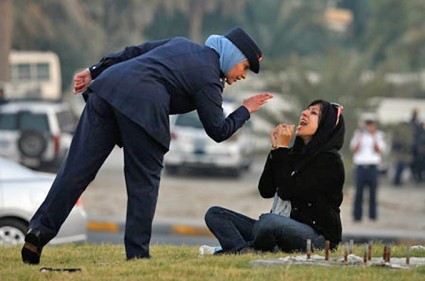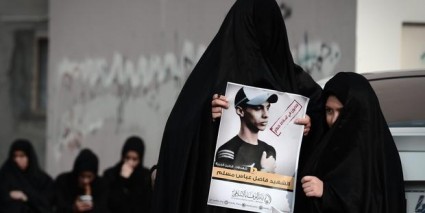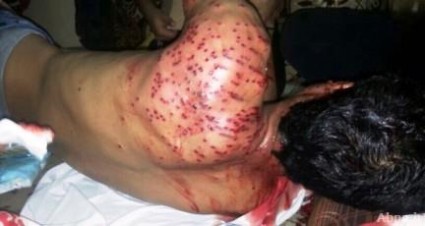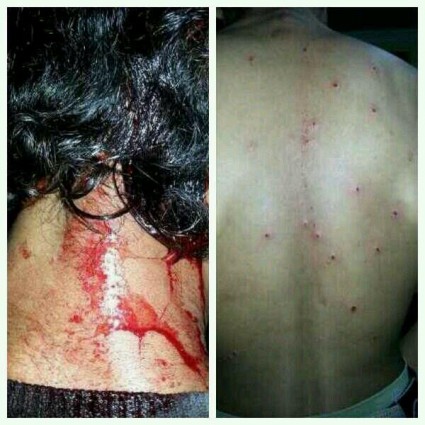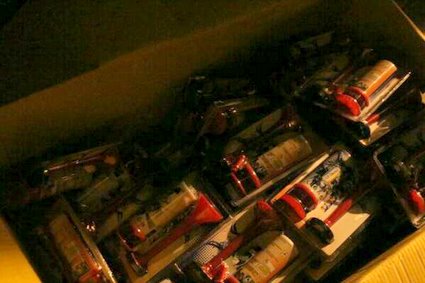Posts from — February 2014
Bahrain follows Saudi Arabia by legalizing Human Rights Violations
HM the King issues four laws
4 February, 2014 – BNA
(BNA) – His Majesty King Hamad bin Isa Al Khalifa today issued four laws for this year.
According to Law 1, Article 214 of Penal Code of 1976 was amended as follows:
“A prison sentence of a minimum of one year and a maximum of two years, and a fine of not less than BD 1000 and not more than BD 10000 shall be the penalty for any person who offends publically the Monarch of the Kingdom of Bahrain, the national flag or emblem, and the penalty shall be tightened if the offence was committed in the presence of the King.”
In Law 2/2013, HM the King ratified the by-law of the GCC Emergency Management Centre.
…source
February 4, 2014 No Comments
New Saudi law legalizes a range Human Rights Violations
Amnesty International censures KSA over controversial law
4 February, 2014 – Shia Post
Amnesty International has censured Saudi Arabia over a controversial counter-terrorism law, calling it the kingdom’s new tool to crush peaceful expression.
The UK-based rights body says the new Saudi law legalizes a range of ongoing human rights violations.
In a Monday statement, Amnesty’s Deputy Director for Middle East and North Africa Said Boumedouha said, “This disturbing new law confirms our worst fears – that the Saudi Arabian authorities are seeking legal cover to entrench their ability to crack down on peaceful dissent and silence human rights defenders.”
This came after Saudi Arabia put into effect the controversial counter-terrorism law that allows Riyadh to prosecute as a terrorist anyone who demands reform, exposes corruption or protests against the kingdom’s policies.
“Passing a law with so many serious flaws two years after identical issues with the earlier draft were pointed out does not bode well for the authorities’ plans to end long-standing violations in the name of counter-terrorism. The changes made to the law since 2011 have done little to diminish the potentially devastating impact on human rights. The legislation just seems to codify the Ministry of Interior’s repressive tactics, which Amnesty International has documented for years,” the statement added.
The law, passed by the council of ministers and ratified by King Abdullah in December last year, went into effect on Saturday.
The legislation, made up of 40 clauses, states that any action that “undermines” the state or society, including calls for change of government in Riyadh, can be tried as a terrorist act. The law also gives security forces and intelligence agencies sweeping powers to raid homes and track phone calls and Internet activity.
A large number of activists, clerics, judges and journalists have been jailed in Saudi Arabia for voicing their opposition to the kingdom’s policies.
Over the past 10 years, Saudi Arabia has also arrested thousands of people and accused them of being involved with al-Qaeda. …more
February 4, 2014 No Comments
American Disphoria – Obama remakes Al Qaeda as the ‘Good Guys’
“True to its origins as a Western intelligence asset, al-Qaeda is helping to create an illusion in Syria that will enable US weapons supply to the militants to continue,”
Re-inventing al-Qaeda as ‘good guys,’ huh?
4 February, 2014 – By Finian Cunningham – PressTV
The titular head of al-Qaeda, Ayman al-Zawahiri, has reportedly disavowed the Islamic State of Iraq and Syria (ISIS). Videos emerged over the weekend of the Egyptian-born leader denying any organizational links with the ISIS.
The British Guardian reported that the move by the top al-Qaeda commander was an attempt to “reassert control” over the disparate militant groups fighting in Syria.
Later in the same report, the newspaper inadvertently hinted at the real motive for the initiative. “The internecine fighting – among the bloodiest in the three-year conflict – has undermined the uprising against President Bashar al-Assad and dismayed western powers pushing for peace talks,” reported the Guardian.
Forget the bit about “dismayed western powers pushing for peace talks.” That’s hogwash. The key phrase is “internecine fighting has undermined the uprising [sic] against President Bashar al-Assad.”
By “uprising,” the Guardian is euphemistically referring to the covert criminal war sponsored by the West against the Syrian government and its people. This is not an uprising or civil war; it is Western state-sponsored terrorism for regime change using foreign mercenaries of varying affiliation to al-Qaeda – the latter itself being historically a Western, Saudi intelligence creation from the late 1970s onwards.
The political problem for the West is that it cannot be seen to be overtly supporting the al-Qaeda brigades. That would very publicly destroy the last vestiges of the so-called War on Terror and 9/11 propaganda myth.
Previously, Washington and its allies have got around that contradiction by claiming that they have been supporting “moderate rebels” in Syria as opposed to the backbone of foreign mercenaries belonging to al-Qaeda. That sleight of hand ran into terminal problems when the “moderates” of the so-called Free Syrian Army were decisively pushed out of the picture at the end of last year by the “extremists.” …more
February 4, 2014 No Comments
Bahrain: Abducted, Beaten and Threatened by Police with Impunity
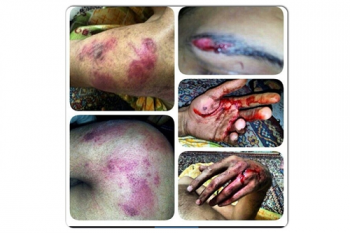
Bahrain: Abducted, Beaten and Threatened
3 February, 2014 – Bahrain Center for Human Rights
The Bahrain Center for Human Rights expresses concern about the continuation of grave violations including abduction of civilians, severe beatings and leaving them in a stranded area. These actions appear to come as a form of punishment and threat for those who participate in pro-democracy protests in the country. The BCHR has document numerous such cases in different areas that witness daily protests demanding the right to self-determination.
A civilian, who asked to remain unnamed for safety reasons, told the BCHR that he was abducted by security forces on the 17th of January 2014. He was reportedly severely beaten with different weapons and blunt objects. He added that he was verbally abused, and the security forces used very derogatory sectarian terms during the beating. The victim was then taken to Karraneh beach, where he thought he would be dumped, but the security forces continued to beat him until he lost consciousness after which they left. A number of Karraneh residents found him and moved him to a house where he was treated by a volunteer nurse as he feared anticipated arrest if he were to go to the hospital. …more
February 4, 2014 No Comments
Manufacturing Dissent
From Egypt, Ukraine, the Turkish-Syrian border, Cuba and Thailand
Manufacturing Opposition Movements
by Andre Vltchek – 3 February, 2014 – Dissent Voice
Government buildings are being trashed, ransacked. It is happening in Kiev and Bangkok, and in both cities, the governments appear to be toothless, too scared to intervene.
What is going on? Are popularly elected administrations all over the world becoming irrelevant; as the Western regime creates and then supports thuggish ‘opposition movements’ designed to destabilize any state that stands in the way of its desire to fully control the planet?
*****
They are shouting and intimidating those who want to vote for the moderately progressive government that is presently leading Thailand. There is no dispute over the electoral process – voting is generally free, as both international observers and most of the local Election Commission members agree.
Freedom, legitimacy or transparency is not what is at stake now.
The rhetoric varies, but in essence, the ‘protesters’ are demanding the dismemberment of the fragile Thai democracy. Most of them are paid by the upper-middle and upper classes. Some of them are thugs, many hired for around 500 Baht a day (roughly US$ 15) in the villages of the restive southern provinces of the country. They are accustomed to the use of violence, their body language and facial expressions clearly show it.
Government officials of the legitimate government have to climb over blockades, or beg protesters to allow them to enter their own offices.
People who came to vote in the pre-election round were intimidated and insulted, and one man was almost strangled to death.
While life in the capital has been fully disrupted, the government does not dare to send in tanks or the police to clear the streets. It should. But it is too scared of the army and the monarchy – two pillars of this outrageous hybrid of savage capitalism and feudalism – comparable only to even worse regional nightmares, such as Indonesia and the Philippines.
It is all in the open now: the government speaks of its fear, while the military sends poisonous threats through the lackey media and through ‘leaks’.
What is happening and what is at stake? The Prime Minister’s older brother, Thaksin Shinawatra, while he was PM himself, attempted to bring in a modern capitalist system to this submissive and deeply scared nation. And not only that: he housed the poor, introduced an excellent free universal medical care system (much more advanced than anything ever proposed in the United States), free and very advanced primary and secondary education, and other concepts deemed dangerous to the world order, and to the local feudal elites, as well as the army. …more
February 4, 2014 No Comments
Syria and Sorting Out A New Balance of Power in the Middle East
The war against Syria and the illusion of compromise
By Ghaleb Kandil – 2 February, 2014 – Voltaire.net
Some politicians believe that Russia and the United States agreed on compromises in the region, and that everything that happens politically and militarily in Syria is part of a scenario to implement these arrangements.
In fact, international relations are going through a transitional period that will see the outlines of a new balance of power. These new equilibrium were able to emerge through the resistance of the Syrian state against the colonial aggression led by the United States. It is clear that the US unilateral post-domination era is under construction. The rules of the new Cold War are not yet definitively drawn. Recognition by the United States at the end of its unilateral hegemony is accompanied by continued attempts to influence the new equations that are emerging.
It is in this context that fit US and Western pressures and interference in the backyard of Russia. Ukraine crisis is the best example of this attitude, as well as the continuation of the partnership between the United States and Saudi Arabia, to prolong the bloodshed in Syria, in the hope of changes for the benefit their agents of balance of power relations underlie all coming political compromise.
These are the realities emerging from the Geneva II Conference, where Americans have negotiated indirectly with the Syrian official delegation, through a delegation established by its ambassador in Damascus Robert Ford. It is in this same context that was taken the decision to exclude Iran from this conference, which was a message to Russia, worthy of the time of the unilateral hegemony through orders given to the Secretary General of the United Nations. The reform of this organization and the rebalancing of relations within it are also unavoidable conditions for establishing a multipolar world.
In this transitional period, the confrontation continues to develop new relations between international powers, and Syria is the mirror of the new international order. The belief in the existence of supposed international arrangements and a serious American will to fight against terrorism, is a pure illusion. Worse, it can distort the calculations and produce erroneous analyzes. …more
February 4, 2014 No Comments
Activist Surrenders after Saudi’s Terrorise his Family
Shia wanted over Saudi protests surrenders: Police
2 February, 2014 – ABNA
A Saudi man wanted in connection with peaceful protests in 2011 among the Shia Muslim minority in the conservative, Sunni-majority kingdom has handed himself in, police said on Sunday.
Musa Jaafar Mohammed al-Mabyuq surrendered to police in the mostly Shia district of Qatif, in Eastern Province, a police spokesman said in a statement carried by the official SPA news agency.
Mabyuq “will be dealt with according to legal procedures,” the unnamed spokesman said, praising “the constructive role of his family” in the surrender, without giving further details or saying when he had given himself up to the authorities.
The unrest in Eastern Province started after an outbreak of violence between Shia pilgrims and religious police in the Muslim holy city of Medina, in western Saudi Arabia, in February 2011.
The protests escalated when Riyadh led a force of Gulf troops into neighbouring Bahrain the following month to help crush Shia-led pro-democracy demonstrations in the tiny Sunni-ruled Gulf kingdom.
Eastern Province is home to most of the kingdom’s two million Shias, who represent 10 percent of the Saudi population. …more
February 4, 2014 No Comments
Bahrain Court of Injustice jails 13 activists defending against Police Violence
Bahrain high court jails 13 anti-regime activists
3 February, 2014 – Islamic Invitation Turkey
Bahrain’s high court has handed long jail terms of up to 15 years to 13 activists, as the Al Khalifa regime steps up its crackdown on demonstrators.
The court issued the verdicts on Monday after convicting the defendants of allegedly possessing Molotov Cocktails, burning tires and attending illegal gatherings in the Salihiya district of the capital, Manama.
The development comes less than a week after Bahrain’s Justice and Islamic Affairs Ministry filed a lawsuit against the Islamic Scholars Council, which is a Shia body, calling for the dissolution of the group and the confiscation of its assets.
The ministry claimed in the lawsuit that the Islamic Scholars Council has been engaged in political activities that “threatened the security of the Arab kingdom.”
Bahrain’s main opposition bloc, the al-Wefaq National Islamic Society, has censured the move, saying “the regime has declared war on Shias.”
A number of Bahraini scholars and clerics have also signed a petition to the UN Secretary-General Ban Ki-moon, in protest at the decision.
Since 2011, anti-regime demonstrations have been held almost every day in Bahrain.
On March 14, 2011, troops from Saudi Arabia and the United Arab Emirates were called in to assist the Bahraini regime in its crackdown on peaceful protesters. According to local sources, scores of people have been killed and hundreds arrested.
International human rights organizations have repeatedly slammed the Manama regime for the excessive use of force against peaceful protests. …more
February 4, 2014 No Comments
Zainab Al-Khawaja’s unending Sentence from Cruel Court of Injusice in Bahrain
Amnesty Int’l: Bahrain: Woman activist sentenced again in Bahrain: Zainab Al-Khawaja
31 January 2014 – Amnesty International
URGENT ACTION
Bahraini activist Zainab Al-Khawaja was sentenced to a further four months in prison by a Criminal Court in relation to two new cases brought against her for “destroying government property”.
On 27 January Zainab Al-Khawaja, dual Bahraini and Danish national, was sentenced by the Lower Criminal Court in Manama, the capital, to a further four months’ imprisonment on charge of “destroying government property”. After neither she nor her lawyer attended trial, Zainab Al-Khawaja was sentenced namely for ripping pictures of the King belonging to the Ministry of Interior, on 4 and 6 May 2012. The trial of another case against her is also due to begin on 5 February. She is charged with “insulting a police officer” because she verbally defended another prisoner who was insulted and humiliated by a prison guard on 22 June 2013 in ‘Issa Town detention centre for women, south of Manama, where both women are held.
Since 27 February 2013 Zainab Al-Khawaja has been serving several short prison sentences in five other cases and was due to be released on 20 February 2014. The sentences issued against her by lower criminal courts are final because she refused to appeal before higher courts believing that Bahrain’s judiciary is controlled by the government. She has also refused to pay bail for her release. Zainab Al-Khawaja has been boycotting court hearings and refusing to appear before the Public Prosecution. However, on 27 January she was informed of the court session half an hour before it was due to take place and she informed her lawyer shortly afterward but he was unable to attend. …more
February 4, 2014 No Comments
Nabeel Rajab chose to return, change Unjust System that keeps him in chains
Bahrain: Nabeel Rajab’s request for early release from prison denied by Bahraini authorities
28 January, 2014 – IFEX
The Gulf Centre for Human Rights (GCHR) and the Bahrain Center for Human Rights (BCHR) have expressed grave concern regarding the Bahraini authorities’ treatment of Nabeel Rajab, the imprisoned president of BCHR and the general secretary of GCHR, in addition to their refusal to grant him the early release he is eligible for as per the law.
A request for early release was submitted by Nabeel Rajab’s lawyers on 21 January 2014 to the court but it was rejected and no reasons were given to back the decision up.
Before announcing his verdict, the judge reportedly did not a take any action to investigate whether conditions for early release had been met. This is the third attempt submitted by Rajab’s lawyers requesting his release, based on article 349 of the Code of Criminal Procedures which sets conditions for early release.
These are as follows:
– Three quarters of the sentence had already been served;
– The defendant exhibits good and trustworthy behaviour whilst in detention;
– The defendant does not pose a threat to public security.
Although all three of those conditions apply to Rajab’s case, all requests submitted by his lawyers were rejected without reason.
In the letter submitted to the judge on 21 January, Nabeel Rajab’s lawyer provided evidence of his eligibility for early release and complained about the discrimination against Rajab in applying the law of early release, as well as the harm he suffered because of the prolonged delay in responding to his request which was submitted to the Court of Cassation to suspend the sentence. …more
February 4, 2014 No Comments
Vain Attempts at Crushing Religious Freedom Intensify Resistance in Bahrain
The regime in Bahrain is continuing its vicious attacks against the religious freedoms in Bahrian by continuously forbidding citizens from praying in the historic mosque of Al-Barbaghi.
Non-stop attacks against religious freedoms in Bahrain
2 February, 2014 – ABNA
The regime in Bahrain is continuing its vicious attacks against the religious freedoms in Bahrian by continuously forbidding citizens from praying in the historic mosque of Al-Barbaghi. The mosque was demolished by the regime forces during the revolutionary uprising in 2011 when 36 other mosques were vindictively destroyed as well.
The arbitrary ban was persistently imposed following the politicized decision to dissolve the clerics Islamic Council, vindictive sectarian measures taken against the Shia’as in Bahrain.
Three citizens were reported to have been arrested as they were attempting to reach the site of Al-Barbaghi mosques which was already besieged with barbed wires and police cars to prevent citizens from exercising their basic religious rights.
Al-Barbaghi mosque is a historic mosque that was built 440 years ago before the ruling family had arrived to Bahrain. The regime demolished it and destroyed the grave of Shaikh Mohammed Al-Barbagi and still refuses to reconstruct despite the fact that the BICI report and many human rights organizations recommended the reconstruction of the mosques destroyed by the regime during the uprising in 2011. …more
February 4, 2014 No Comments
Bahrain Regime intensifies Crackdown with intense assualt on Protests
February 4, 2014 No Comments
Bahrain Regime Dismantles Cleric’s Council in vain move to crush Dissent
Bahrain shuts Shiite clerics’ council
29 January, 2014 – Agence France Presse
DUBAI: A Bahraini court shuttered on Wednesday a Shiite Muslim clerics’ council, after authorities in the Sunni-ruled kingdom accused it of politicization and illegal operations.
The court ordered the closure of the Olamaa Islamic Council and the liquidation of its assets following a lawsuit by the ministry of justice, Islamic affairs and endowment, a judicial source said.
The ministry said in September that the office had been “functioning outside the law”.
The verdict came as authorities crack down on opposition action by Shiites, who make up the majority of the population in the Gulf archipelago.
The council led by prominent cleric Issa Qassem “violates the constitution and the laws of the kingdom,” the ministry said at the time, accusing its members of “using it to practise politics under a confessional cover”.
The council also “adopted the call for the so-called revolution,” it charged, referring to Shiite-led protests against the government that erupted in February 2011 before being dispersed a month later.
Home to the US Fifth Fleet and strategically situated across the Gulf from Iran, Bahrain still sees sporadic Shiite-led demonstrations, mostly outside the capital Manama.
At least 89 people have been killed in Bahrain since the protests began, according to the International Federation for Human Rights. …more
February 4, 2014 No Comments
Bahrain Police to walk with Impunity in murder Fadel Abbas – shot in head
Bahrain: Death of young detainee shot in head must be investigated
Fadel Abbas was shot by security forces as he tried to visit a recently released prisoner in the village of Markh.
“Bahrain’s authorities must come clean and open a full, independent investigation to establish the truth about the death of Fadel Abbas. Those responsible for his death must be held to account.”
Said Boumedouha, Deputy Director of Amnesty International’s Middle East and North Africa Programme.
The Bahraini authorities must immediately investigate the death in custody of a 19-year-old boy who was shot in the head by security forces, said Amnesty International.
“Bahrain’s authorities must come clean and open a full, independent investigation to establish the truth about the death of Fadel Abbas. Those responsible for his death must be held to account,” said Said Boumedouha, Deputy Director of Amnesty International’s Middle East and North Africa Programme.
“The conflicting information that has emerged over the version of events that led to his death makes such an investigation even more urgent.”
Fadel Abbas was wounded when security forces tried to arrest him and others as they went to visit a recently released prisoner in the village of Markh.
The Interior Ministry said in a statement on 26 January that Fadel Abbas had died of his wounds after he was shot on 8 January when he “purposefully” drove a car into members of the security forces as he attempted to escape arrest for smuggling arms and explosives. The Ministry said its forces had acted in self-defence.
Human rights activists, who published pictures of the body of Fadel Abbas, said that he sustained bullet injuries in the head and wounds to the leg during a violent altercation with the security forces.
Fadel Abbas’s family were also not told he had been arrested when they asked police about him after he went missing.
Fadel Abbas’s mother said that the Criminal Investigation Directorate had contacted her on 26 January to inform her of her son’s death. Prior to this the family said they were not given any information about his whereabouts or medical condition and were not allowed to visit him in hospital. The Interior Ministry has stated that Fadel Abbas’s family were allowed access to him on 13 January.
The killing of Fadel Abbas has triggered protests in the village of Diraz, west of the capital Manama where his funeral was held. Police fired tear gas and gunshots as they clashed with protesters after the funeral.
…more
February 4, 2014 No Comments
Bahrain Regime Froces Murder Fadel Abbas Musalem, 20 years old
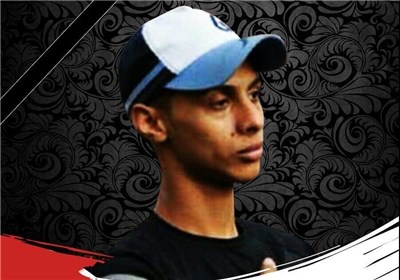
Young Bahraini Dies of Wounds
27 January, 2014 – Tasnim
TEHRAN (Tasnim) – A young Bahraini prisoner died of wounds he suffered during a police operation to detain him as the main political opposition group said the man died as a result of torture during his detention.
printPrint
A ministry statement said Sunday that Fadel Abbas Musalem, 20, had been taken to hospital after being “wounded in the head” on January 8 when police tried to arrest him in a village near the capital Manama.
It added that police acted in “legitimate defence” when they fired on a car carrying Musalem and another man when it kept driving towards security forces despite warning shots.
The other man was also arrested.
Musallem was part of a group suspected of “involvement in smuggling weapons and explosives and in terrorist acts”, the ministry added.
But the main Shiite opposition group Al-Wefaq said Musallem had been tortured “savagely”, AFP reported.
It said in a statement that besides a wound to his head, his body had signs of “bruises on his back, around the neck and on his face”.
His lip had also been cut and he had a “deep wound to the right shoulder”, Al-Wefaq said.
Thousands of people attended his funeral on Sunday in Daraz, a Shiite village near Manama, chanting anti-government slogans, witnesses said.
Security forces later intervened when “saboteurs threw Molotov cocktails at them and closed a main road”, the interior ministry said on Twitter.
Since mid-February 2011, thousands of pro-democracy protesters have staged numerous demonstrations in the streets of Bahrain, calling for the Al Khalifa royal family to relinquish power.
The demonstrations were dispersed in mid-March in a deadly crackdown helped by security forces from neighbouring Saudi Arabia.
Demonstrators frequently clash with security forces in villages outside the capital.
…more
February 4, 2014 No Comments
US Frustrates Democracy in Bahrain to Preserve its Military Foot-hold
February 4, 2014 No Comments
The Legend of Bahrain
February 4, 2014 No Comments
Maiming by Birdshot – The Timoney and Yates Doctrine
The extensive, heavy handed, use of Bird-shot against Protesters did not appear until the Bahrain Regime hired John Timoney and John Yates as Security Consultants at the behest of the US Secretary of State Clinton. It emerged as a means to maim protesters so they could be captured when the sought medical attention. The practice conspicuously evolved immediately following the BICI Report that the regime has largely failed to implement. Has anyone ever noticed how much Iraq’s Saddam and King Hamad look alike – creepy. Phlipn out.
Bahrain’s doctors – Harsh treatment
28 January, 2014 – by Economist
IN THE three years since Bahrain’s iteration of the Arab spring sputtered out in the grip of a government crackdown, Rula al-Saffar, 51, has gone from nurse to detainee to activist. At her home a stone’s throw from the hospital where she is effectively barred from working, Ms Saffar is busy with a campaign she began in December to track and tally Bahrain’s prisoners of conscience.
“Our mission is to get them released and for the government of Bahrain to respect all the international covenants regarding prisoners of conscience,” she said, wearing a t-shirt bearing the image of Martin Luther King Jr. So far, families have registered 161 detainees on the campaign’s website, 56 of whom are students.
This activism is probably not what the ruling Khalifa monarchy hoped for when it brought criminal charges against Ms Saffar and 20 other medics for their alleged support for anti-government protests that took place in February and March of 2011. Rather than give up, Ms Saffar is now turning other Bahrainis into amateur medics.
After being released from her five months in detention in 2011, during which Ms Saffar said she was electrocuted, slapped around and sexually harassed, she was told she could only return to her job as head of a nursing program at Bahrain’s College of Health Sciences if she swore an oath of loyalty to the regime. She refused.
Now she delivers instructions for basic medical treatments over Skype, fearing that treating protesters in person could land her back in jail. Nearly every week, she says, she gets phone calls from those at protests in Manama’s Shia-majority suburbs such as Karrana and Sanabis, hotspots for dissent against the ruling Sunni Khalifa family, asking how to dress wounds.
The difficulty of Ms Saffar and many of her fellow medics is linked to the decision of both protesters and security forces to make Salmaniya, the country’s only full-service public hospital, a flashpoint of the 2011 unrest. Bahraini security forces in March 2011 took control of Salmaniya and cordoned off part of the sixth floor to interrogate patients, an independent commission found. The commission also concluded that some doctors in Salmaniya strayed from medical neutrality by participating in anti-government demonstrations.
Bahrain’s medical system has yet to recover from this politicisation. Doctors detained in 2011 who have returned to work say that it is still not safe for those wounded in clashes with police in ongoing unrest to seek treatment at a public hospital, or even at some private clinics.
According to a doctor working in Salmaniya, a patient who shows signs of protest-related wounds—burns to the hands or birdshot to the body—will be interrogated by a hospital security guard, often before a nurse or doctor has seen him. The guard then monitors the patient throughout his stay in Salmaniya and often arrests him after he is discharged, the doctor said. This exact scenario is difficult to verify (the Ministry of Health declined to comment by phone), but several doctors interviewed agreed that the threat of arrest hangs over protesters who check into a hospital. Protesters now tend to avoid hospitals unless gravely wounded.
Some doctors try to help by quietly treating people. “It’s my medical obligation to treat those regardless of the type of injury or the trauma inflicted on them,” said a surgeon who runs a private clinic in Manama. In recent weeks, he treated a teenager whose orbital socket had been broken, allegedly by a combination of a stun grenade and a policeman hitting him in the face.
The doctor asks protesters to lie low until bodily signs of clashes with the police have subsided. He then registers the patient as suffering from a cold or simple ailment that won’t draw the attention of security forces. He stitches the protester up, prescribes medication and sends him on his way. …more
February 2, 2014 No Comments
Bahrain’s Fate and Visioning it’s Future
I remember meeting Sharif a few days before the crackdown. We sat at a burger restaurant, and I asked him about their main demand. He said, “The most important is to elect a constitutive committee representative of the people to write a new constitution for the country to replace the current one. Everything else is secondary.” I said, “You realize they will not accept that, and that this basically means there will be a showdown.” He looked up from his hot dog, paused, and then nodded.
“Yes, it probably does.”
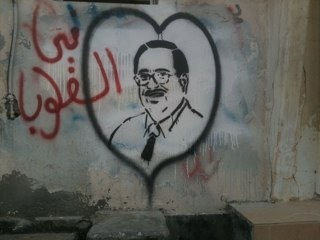
Bahrain’s Fate
by Omar AlShehabi – JACOBIN – January, 2014
On Ibrahim Sharif and the misleadingly-dubbed “Arab Spring.”
The Arab uprisings have unleashed fraught issues around identity and national sovereignty. Within the struggles for a better future, opportunism and sectarian politics run rife. Amid suffusing uncertainty, some yearn for despotism or the old stability of Western colonialism.
Although the events have given way to many movements, activists that oppose the hydra of Western intervention, despotism, and sectarianism that confronts the Arab world are rare. Ibrahim Sharif, a Bahraini opposition figure, is a prominent exception. And, manifestly, a dangerous one: he is currently in prison, having been tortured, and facing the remainder of a five-year sentence. His plight has barely registered beyond Bahrain’s shores, but there is no better story than his to illustrate the complexity of this necessary fight.
Sharif was born on 15 May 1957, the ninth anniversary of the Nakba — which saw the expulsion of hundreds of thousands of Arabs from historic Palestine — and the establishment of the state of Israel. His birthplace was Muharraq, the second-largest island in the Bahraini archipelago, and at that time the hub of political opposition to British colonialism. Sharif’s home was in Steeshan, a lower-middle-class neighborhood deriving its name from the English word “Station,” after the old central bus station that used to be located at the top of the neighborhood.
As with most people in Steeshan, Sharif’s family came from a Huwala background — a Sunni ethnicity that populates the two coasts of the Gulf, between the colliding Arab and Persian cultures. Such movement between the Gulf’s two worlds used to be commonplace, especially in a maritime economy built on mercantilist trade, well before the drawing of borders and the advent of modern nationalities in the region.
Sharif’s family came to Bahrain in the early twentieth century from Behdeh, a small village on the eastern coast. He came from a Sayyed lineage, his family claiming descent from the Prophet Mohammed’s daughter. Sayyed families have much less resonance among Sunni discourse than Shi’a, as the concept confers much more social, economic, and religious prestige and benefits to the latter.
The Huwala are a minority in Bahrain. Some members within the other ethnic groups look on their claims of Arabness with suspicion, due to their roots on the eastern coast of the Gulf. This perspective suggests a racial view of Arabness, imagining it can only be determined by clear and unbroken lineage to a tribe from the Arabian Peninsula. This blood-based identity discourse contrasts sharply with the modern notion of Arabness accompanying Arab nationalism, which takes language to be its primary trait.
This complex historical lineage has led many Huwala in Bahrain to embrace Arab nationalist currents, and the city of Muharraq, where most Huwala are concentrated, has become that movement’s main urban center. This is common among many minorities in the Arab world. For example, Christians and Alawites also disproportionately fill Arab nationalism’s ranks. The ideology has been presented as a unifying, non-sectarian, non-racial force that could guard against the tyranny of the majority and facilitate development in societies prone to sectarianism and ethnic divisions. …more
February 2, 2014 No Comments
20 Years of Walking Slowly – the struggle we share on every corner and village in the world
From Fire to Autonomy: Zapatistas, 20 Years of Walking Slowly
25 January, 2014 – By Andalusia Knoll and Itandehui Reyes -Truthout
Journalism with real independence and integrity is a rare thing. Truthout relies on reader donations – click here to make a tax-deductible contribution and support our work.
Speaking in the mountains of Chiapas, Mexico, on a cold drizzly New Year’s Eve, the Zapatista Comandante Hortensia addressed the crowd: “Twenty-five or 30 years ago we were completely deceived, manipulated, subjugated, forgotten, drowned in ignorance and misery.” She was communicating the official words of the Zapatista Army of National Liberation (EZLN) on the 20th anniversary of their rebellion, when thousands of indigenous people rose up in arms, took over dozens of major towns and villages in this southern state, and declared “enough is enough, never again will there be a homeland that doesn’t include us.”
Comandante Hortensia went on to explain how over the past two decades, they have constructed their own autonomous government, complete with their own health and education system, based in the indigenous traditions of their ancestors. Despite the continual efforts of the “neoliberal bad government” to displace them from their land, the Zapatistas have successfully recuperated thousands of acres of land on which they have constructed communities that are governed “from the bottom up.” Community members participate in rotating government positions that operate under the democratic principle of “mandar obedeciendo” (commanding by obeying).
The Mexican government has attempted to introduce social programs with the goal of co-opting and dividing the indigenous population in Zapatista areas. However, the indigenous rebels, who reject all forms of government handouts, have successfully resisted co-optation. If you ask a Zapatista how many are in the ranks, they will just respond “somos un chingo,” which loosely translates into “there are a whole lot of us.” Official estimates put their numbers at 250,000 people or roughly 10 percent of the population of the state of Chiapas.
Zapatista communities are spread throughout the large southern Mexican state of Chiapas, which includes coastal, mountainous and jungle regions. They have created five Caracoles, which are the centers of “good government” and points of coordination for the Zapatista health clinics, schools, community banks and independent media projects.
Resistance to NAFTA, the Death of the Mexican Farmer
On January 1, 1994, the NAFTA free trade agreement entered Mexico with vigor, promising foreign investment and economic prosperity at the expense of the plunder of natural resources. NAFTA is largely credited for flooding the Mexican market with subsidized corn from the United States, which decimated farmers’ livelihoods and provoked massive migration to the United States. Two years prior to NAFTA’s implementation, former President Carlos Salinas opened the floodgates to land privatization by reforming Article 27, which had protected communally owned land known as ejidos, created during the Mexican revolution. Thus, the introduction of NAFTA provided the perfect context for the uprising of the indigenous guerillas who formed the EZLN. …more
February 2, 2014 No Comments
Bahrain’s Crown Prince Salman deceives with dialogue, guns young men down in Streets
Time running out as Bahrain tries to revive national dialogue
By Bill Law – BBC News – 29 January, 2014
Bahrain’s Crown Prince Salman bin Hamad bin Isa Al Khalifa shows the UK’s Prince Andrew round the Bahrain International Airshow (16 January 2014) The meeting between Prince Salman (centre) and the opposition came a day before a visit by Prince Andrew
A recent meeting between Bahrain’s crown prince and opposition representatives has raised hopes that the suspended national dialogue process could be revived. The BBC’s Bill Law looks at the prospects for ending the deadlock in the Gulf island kingdom.
Prince Salman bin Hamad bin Isa Al Khalifa’s decision to hold talks on 15 January with leaders of the five main opposition groupings for the first time since pro-democracy protests erupted three years ago surprised many observers.
Afterwards, the main Shia opposition bloc, al-Wefaq, said the meeting had been “especially frank and very transparent” and studied ways to have a “serious dialogue that would result in a new political framework that shapes a comprehensive solution”.
The government meanwhile said the parties had committed to “accelerate dialogue and elevate discussion by including more senior representatives from all parties”.
The meeting was notable for at least two reasons.
The first was the prominent role of the crown prince.
Seen as a moderate in the Sunni ruling family, the Al Khalifa, he has effectively been sidelined since 2011 by hardliners who want few if any concessions to be made to the Shia majority demanding greater rights and an end to discrimination.
The second reason was the presence at Prince Salman’s side of one of those hardliners – the Minister for the Royal Court, Sheikh Khaled bin Ahmed bin Salman Al Khalifa.
The hardliners have been accused of trying to undermine the national dialogue, so it was surprising to see Sheikh Khaled at a meeting to revive the process only days after the government had suspended it, blaming the opposition for the breakdown.
‘Deep-rooted issues’
A source told the BBC that after halting the dialogue, the Khalifas had come under “intense” pressure from Western allies to get it back on track.
“The royal family needed to show the UK and US that it was doing something.”
However, the source said the opposition’s meeting with the crown prince had been merely a “branding exercise”, adding: “The hardliners are simply playing for time.”
Not long after the talks, the UK government published its response to a critical report by the House of Commons Foreign Affairs Committee.
MPs had criticised what they described as the failure of Bahrain to “quickly implement the important and practical recommendations of the Bahrain Independent Commission of Inquiry”, a review commissioned by King Hamad bin Isa Al Khalifa in 2011 that delivered a searing indictment of his government and its handling of the protest movement. …more
February 2, 2014 No Comments
Big Oils last Stand: Gathering Clouds form ‘Epic’ Opposition from Native American Alliance
The Oglala Sioux Tribe passed a resolution Friday banning TransCanada and former AFN national chief Phil Fontaine, who has been hired by the energy firm to deal with First Nations opposition to its Energy East project in Canada, from entering its territory.
Keystone XL ‘Black Snake’ Pipeline to Face ‘Epic’ Opposition from Native American Alliance
by Jorge Barrera – APTN National News – 1 February, 2014
A Native American alliance is forming to block construction of TransCanada’s proposed Keystone XL pipeline which still needs final approval from U.S. President Barack Obama after the State Department released an environmental report indicating the project wouldn’t have a significant impact Alberta tar sands production.
Members from the seven tribes of the Lakota Nation, along with tribal members and tribes in Idaho, Oklahoma, Montana, Nebraska and Oregon, have been preparing to stop construction of the 1,400 kilometre pipeline which is slated to run, on the U.S. side, from Morgan, Mon., to Steel City, Neb., and pump 830,000 barrels per day from Alberta’s tar sands. The pipeline would originate in Hardisty, Alta.
“It poses a threat to our sacred water and the product is coming from the tar sands and our tribes oppose the tar sands mining,” said Deborah White Plume, of the Oglala Sioux Tribe, which is part of the Lakota Nation in South Dakota. “All of our tribes have taken action to oppose the Keystone XL pipeline.”
The U.S. State Department released its long awaited environmental report on TransCanada’s proposed pipeline Friday. The report found that the pipeline’s operation would not have a major impact on Alberta tar sands production which is also at the mercy of market forces.
“Approval or denial of any one crude oil transport project, including the proposed project, is unlikely to significantly impact the rate of extraction in the oil sands or the continued demand for heavy crude oil at refineries in the United States based on expected oil prices, oil sand supply costs, transport costs and supply-demand scenarios,” said the report.
The project will now go into a final phase which focuses on whether Keystone XL “serves the national interest.” Pipeline’s environmental, cultural and economic impacts will be weighed in this phase and at least eight agencies will have input on the outcome, including the Department Defence, Justice, Interior, Commerce, Transportation, Energy, Homeland Security and the Environmental Protection Agency. …more
February 2, 2014 No Comments
Terrorizing Dissent
Terrorizing Dissent: Harper’s approach to defining terrorism is shamelessly bald
By Azeezah Kanji – 31 January, 2014
“When a government starts trying to cancel dissent or avoid dissent is frankly when it’s rapidly losing its moral authority to govern.” — Stephen Harper, 2005 (as Leader of the Opposition)
If dissent is the lifeblood of democracy, then Prime Minister Stephen Harper seems determined to render Canada anaemic.
The backdrop for Harper’s latest assault was his recent visit to the Middle East. The National Council of Canadian Muslims (NCCM) criticized the inclusion of a supporter of anti-Muslim demagogues Pamela Gellar and Robert Spencer in Harper’s Israel-bound entourage.
Instead of addressing NCCM’s concern, the Prime Minister’s Director of Communications Jason MacDonald peremptorily dismissed it with a vicious smear:”We will not take seriously criticism from an organization with documented ties to a terrorist organization such as Hamas,” MacDonald said.
This is a very serious claim, with potential criminal implications: Hamas is officially listed as a terrorist organization in Canada. To level such an accusation without a shred of competent evidence is quite likely libellous. Presumably, if there actually were any documents backing the assertion of “documented ties to a terrorist organization such as Hamas,” the government would have produced them and charged NCCM in a court of law — rather than resorting to indictment in the court of public opinion.
Since the inception of the “war on terror,” insinuations of terroristic connections have been used to vilify Canadian Muslims as “not really Canadian” and disloyal, treasonous, unentitled to the rights and benefits of belonging to Canada. Canadian Muslims erroneously branded as “terrorist threats” have been extraordinarily rendered (Maher Arar), incarcerated in foreign prisons and tortured (Maher Arar, Ahmed El-Maati, Abdullah Almalki and Muayyed Nureddin), stranded abroad and actively prevented from returning home (Abousfian Abdelrazik) and harassed at airports and borders (too many to name).
For Muslims in Canada, being falsely accused of terrorism is quite literally terror-producing. And the damage isn’t cured by formal exoneration: as Justice Dennis O’Connor observed in his report on the Arar case, “Labels, even unfair and inaccurate ones, have a tendency to stick.” …more
February 2, 2014 No Comments
Violence Sounding – Regime Discovers Large Terrorist Weapons Cache in Bahrain
February 2, 2014 No Comments
Rihanna al Mousawi, Tormented for Protest, Imprisoned on Lies
Rihanna al Mousawi, Tormented for Protest, Imprisoned on Lies
02 February, 2014
Rihanna al Mousawi was arrested last April for “planning to bomb” the FI Race. She and Nafeesa were accused by the Public Security Chief General Tariq Hassan of attempting “ a dry run to test the security measures at the F.I.” by carrying a cushion under their dresses.
What happened to her after the FI races ? She was tortured and her 16 year old son Husein was threatened with torture. She was taught a “fabricated tale” several times and beaten on her head if she made a mistake. She was threatened with rape if she changed her story and forced to stand naked in a doorway. She was interrogated for 3 hours by the Attorney Genera Fahed Albuainain and then allowed to phone her family briefly.
She suffered a further interrogation by seven hooded men holding up photos of activists including Naji al Fateel, Hadi Al Moussawi and Hisham al Sabbagh, demanding if she knew them. She was accused of going to the Lebanon to receive training in weapons. Rihanna thought she’d be accused of campaigning for the detainees at the F.I. Race. She now finds herself accused of being a member of the “14th February Coalition” a vague media group that is anti-Government.
At the first court session she bravely spoke about her torture but Judge Ali Al Deraini laughed and wasn’t interested. He allowed the prosecution to make their case, but denied the defendants or defence lawyers to say anything. The defence lawyers petitioned to have the Judge removed for bias, but failed.
The 14th February defendants were sentenced to 5 – 15 years on 25th September 2103 and are appealing. Rihanna and Nafessas have the separate case on the “bombing” charge. The next session for the 14th Feb is 27th February and the bombing charge on16th February.
Rihanna is seriously ill with cancer, has a jaw brace and is confined to a wheel chair. What can you do to help her? Demand her release and say FI Race should NOT take place in Bahrain in April 2015. Otherwise another 60 people will be tortured and jailed for our sporting pleasure.
February 2, 2014 No Comments

